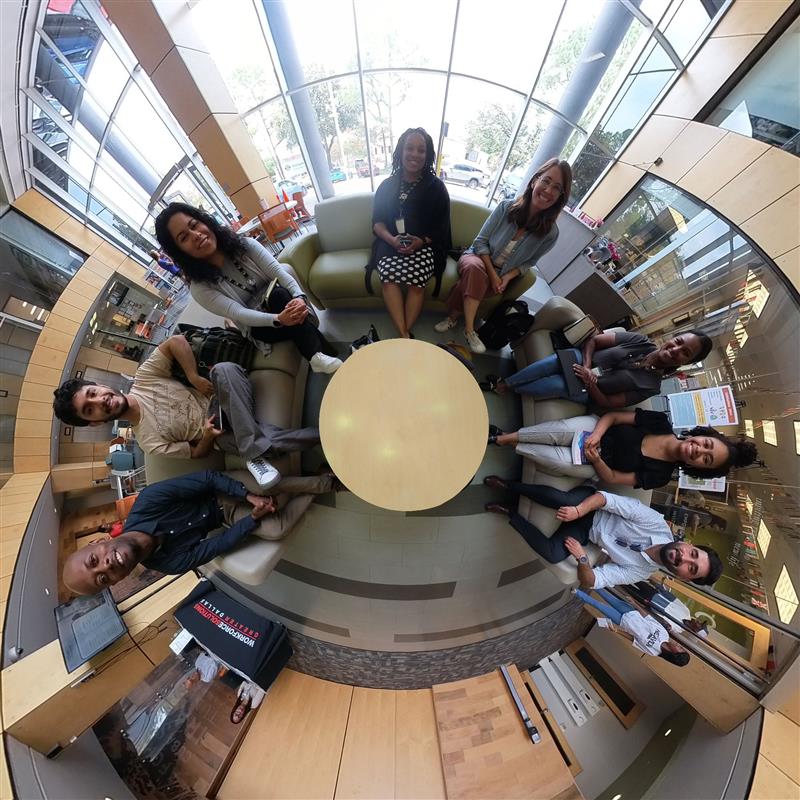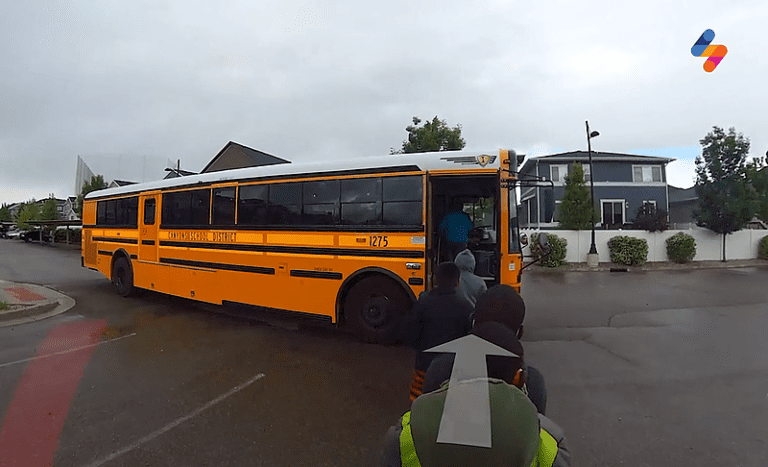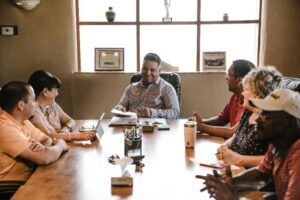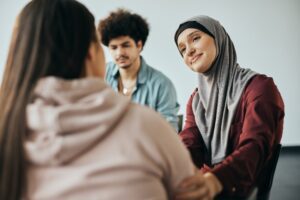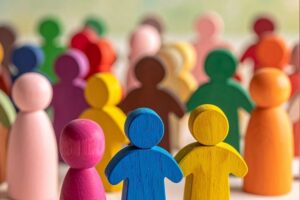This blog showcases how 360° virtual reality (VR) videos are transforming refugee resettlement services in Seattle, Dallas, and Sacramento. With support from Switchboard’s Emerging Technologies Team providers have created immersive experiences that help newcomers navigate education systems, transportation, and community resources before encountering them in real life—building confidence while improving service delivery outcomes.
Why Immersive Learning?
Imagine stepping into a doctor’s office for the first time in a new country. The unfamiliar signs, procedures, and interactions can feel overwhelming. Now, imagine having the chance to experience this virtually before your actual appointment—exploring the space, hearing the conversations, and mentally preparing for what’s to come. This is the power of immersive learning through virtual reality (VR).
At Switchboard, our Emerging Technologies training team has discovered that, while learning by doing is ideal, immersive VR experiences are a close second. We work hand-in-hand with service providers in the resettlement sector to integrate VR technology into their programs, creating computer-generated environments that feel remarkably real. Users don’t just watch—they’re transported into scenarios that matter for their integration journey.
Using a co-creation design method, we collaborate with both service providers and newcomers to develop and film 360° VR videos that simulate essential life situations, such as visiting health care facilities, navigating educational institutions, and using public transportation. Wearing VR headsets, or using smartphones, newcomers can look in every direction and feel present in these environments before encountering them in real life. This technology is revolutionizing resettlement services by improving access, fostering community among professionals, and promoting a sense of safety and confidence for recent arrivals.
Training and Technical Assistance for 360° Videos
In 2024 and 2025, Switchboard’s Emerging Technologies team helped facilitate four in-person co-creation sessions in Sacramento, Dallas, Seattle, and San Diego. Each session included a series of planned activities aimed at achieving a specific, valuable outcome for the local program or organization. Specifically, participating organizations learned how to use the co-creation design process to develop media products tailored to the needs of newcomers in their city. Below, we highlight each of these sessions with links to the specific co-created 360° media.
Luther Community Services Northwest: Unaccompanied Refugee Minors Program (June 2024 to February 2025)
The Seattle-based project with Refugees Northwest Foster Care (RNWFC)—a program from Lutheran Community Services Northwest (LCSNW)—focused on creating immersive learning experiences for unaccompanied refugee minors (URM). These youth, supported by the Office of Refugee Resettlement (ORR), have arrived in the U.S. without parents or relatives and face the challenge of building independent lives in a completely new environment.
After three months of virtual listening sessions with RNWFC staff and former URMs, Switchboard helped identify a critical need: helping youth understand and navigate post-secondary education options. Many URMs struggle with the complex landscape of American education, often experiencing internal fears and insecurities about their ability to succeed.

The project culminated in a collaborative filming effort with RNWFC service providers and three URM students. Together, we created 360° VR videos at Seattle University and on the site of Apprenticeship and Nontraditional Employment for Women (ANEW), a technical program for the construction industry. These videos don’t just show physical spaces—they incorporate voiceovers expressing the internal thoughts, questions, and concerns that URMs typically experience when considering their educational futures.
RNWFC will integrate these videos into their training for service providers and foster parents, helping them better support newcomer youth as they explore educational pathways. The English version is available now, with Spanish translations coming soon.
IRC Dallas Health Program (June 2024 to November 2024)
For the International Rescue Committee (IRC) in Dallas, our session focused on helping newcomers in intensive case management improve their transportation navigation skills—specifically when using ride-share services to access essential services like health care.
The project evolved through listening sessions that initially pointed toward hospital navigation. However, transportation to these facilities emerged as an even more fundamental need. During in-person training in July 2024, IRC Dallas health team members became the creative force behind the project—serving as actors, camera operators, and directors for a ride-share instructional video.
Participants also learned and implemented the co-creation design method, incorporating newcomer experiences into the design process. This collaborative effort led to the design, filming, and production of a 360° VR video, which instructs newcomers in intensive case management programming on how to use ride-share services to access vital community resources, such as a clinic visit.
[Access the full Ride-Share Interactive Module HERE]
Or watch the individual parts below:
[Clip 1 – Uber/Lyft Pickup]
[Clip 2 – Arriving at the IRC Dallas Office]
[Clip 3A – Arriving at the Northwest Community Center]
[Clip 3B – Enrolling for Services at Northwest Community Center]
[Clip 3C – Visiting the Northwest Community Center Clinic]
[Clip 3D – Collecting a Prescription at the Northwest Community Center Pharmacy]
IRC Sacramento’s Youth Program and Mira Loma High School (March 2024 to June 2024)
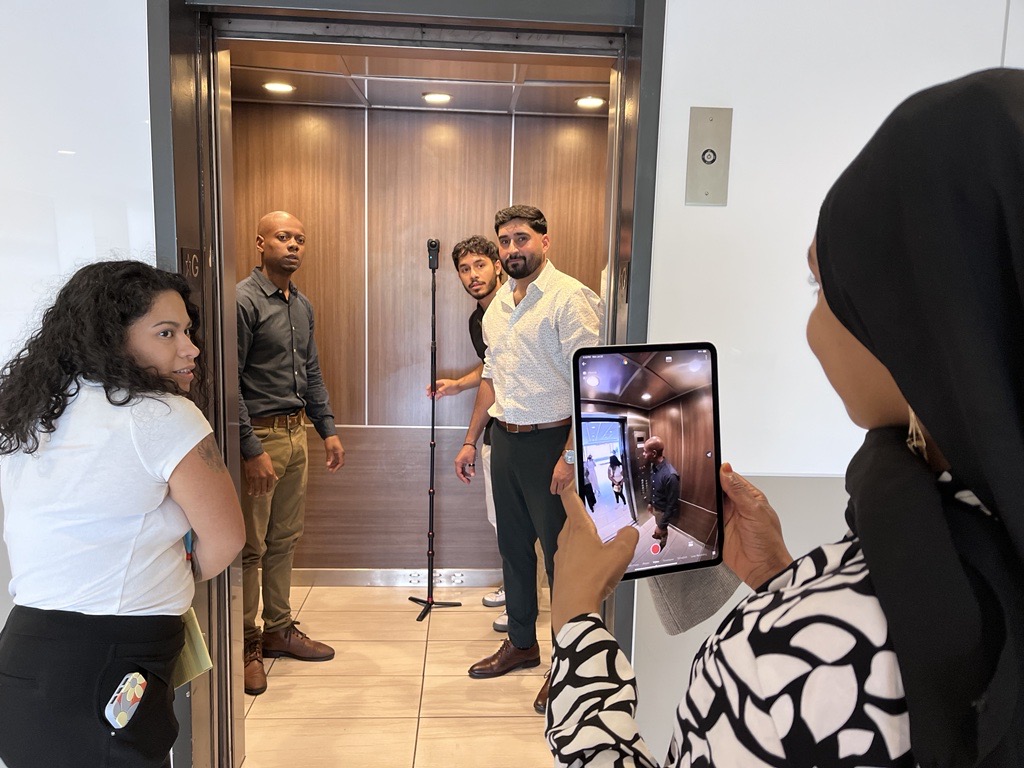
IRC Sacramento’s Youth Program partnered with Switchboard to enhance school navigation for newcomer youth and their caregivers. Following sessions in March 2024, youth service providers and select youth leaders gained proficiency with VR technology while implementing our co-creation design method.
The team developed a detailed storyboard highlighting essential information for orientation to American schools. With generous cooperation from Mira Loma High School in Sacramento, we filmed throughout the campus with participation from actual teachers and students. The resulting 360° video, available in English, Pashto, and Dari here, now serves as a powerful orientation tool for newcomer youth and their families. Check out the blog Co-creating Virtual Reality Videos to Support Newcomer Youth for more details.
IRC San Diego: Job Readiness and Digital Literacy (August 2024 to September 2025)
Switchboard’s 360° immersive learning tool co-created with IRC San Diego focused on building job readiness skills for newcomers. Through virtual listening sessions (online, collaborative meetings designed to gather stakeholder feedback and insights) over six months and in-person training in August 2025, the team identified a critical need: helping recent arrivals understand the unspoken cultural norms of American job interviews, including professional appearance and body language.
Using the co-creation design method, the team shared existing VR videos with English as a Second Language (ESL) classes of new arrivals, who provided valuable feedback on their primary job-seeking challenges and preferences for the video design. These insights were integrated directly into the storyboard. The IRC San Diego staff served as both the creative team and on-screen talent, developing an immersive 360° VR experience that guides newcomers through the entire interview process. The interactive video allows users to practice key moments, such as greeting a receptionist, maintaining eye contact, and asking thoughtful questions, before encountering these situations in real life. With prompts highlighting essential actions and branching scenarios that provide immediate feedback, the module transforms job preparation into an engaging, confidence-building experience.
IRC San Diego will integrate this VR training into their Vocational English as a Second Language (VESL) programming, equipping newcomers with relevant cultural knowledge and exposure to digital tools to help them successfully enter and navigate the American workforce.
Looking Ahead
To make its 360° modules more accessible, the Switchboard team is prototyping a VR game for newcomers that mimics a city environment. The game can be played on a VR headset or via mobile device. The city in the game resembles a typical mid-size U.S. city, and players can explore public spaces and enter immersive environments via existing 360° videos within the city. For example: when a player enters a medical clinic in the game, existing 360° pharmacy and clinic videos begin to play.
Once completed, this game prototype will be used as a resource for technical training on developing community navigation skills and integrating digital skills into resettlement practices. As currently planned, the private ITA 360° videos will be uploaded to this game for the larger network of service providers and newcomers to access.
Learn More
- Switchboard Toolkit: Getting Started with Virtual Reality: Guide for Introducing VR Technology in Refugee Resettlement Service Provision (2024)
- Switchboard Blog Post: Co-creating Virtual Reality Videos to Support Newcomer Youth (2024)
- Switchboard Blog Post: The Eight Stages of Co-creation: Tips for Refugee Service Providers (2024)
If you are interested in learning more about using VR in the resettlement process, submit a request here.
The IRC received competitive funding through the U.S. Department of Health and Human Services, Administration for Children and Families, Grant #90RB0053. The project is 100% financed by federal funds. The contents of this document are solely the responsibility of the authors and do not necessarily represent the official views of the U.S. Department of Health and Human Services, Administration for Children and Families.

